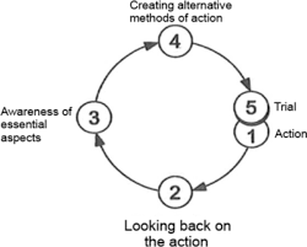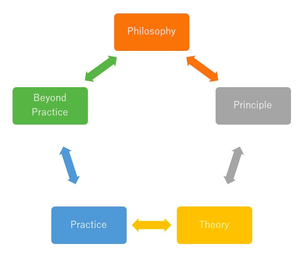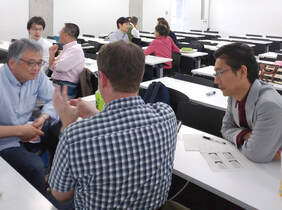How practitioners are regarded in reflective practice |
1. Practitioners' experiences are regarded as professional knowledge.
Knowledge has long been regarded as what is found and established by researchers. In reflective practice, teachers' tacit knowledge has been regarded as professional knowledge (Schön 1983, 1987). 2. Practitioners are acknowledged as creators and owners of knowledge. Knowledge has been regarded as what is bestowed upon practitioners from researchers and teacher educators (Widdowson, 1978). If practicing teachers' tacit knowledge is professional knowledge, practitioners are acknowledged to be legitimate owners of knowledge (Johnson & Golombek, 2002). 3. Reflection is recognised as a productive form of professional development. Professional development of practitioners often means attendance at lectures and reading books written by scholars. If practicing teachers' tacit knowledge is professional knowledge, looking back at one's professional knowledge can be a way of professional development (Watanabe, 2016). |
Definition |
Just as many other abstract concepts, reflective practice renders itself to plethora of definitions and interpretations. Reflective practice is a developmental process of one’s engagement in one’s practice and oneself. The interpretations are likely to change as one travels through the paths of reflective practice. The following definition by Farrell will be helpful to understand what reflective practice is:
A cognitive process accompanied by a set of attitudes in which teachers systematically collect data about their practice, and while engaging in dialogue with others use the data to make informed decisions about their practice both inside and outside the classroom (Farrell, 2015, p. 123). |
Processes of Reflective Practice |
There are several frameworks that describe the reflective process.
|
Principles of Reflective Practice |
1. Reflective practice encourages self-respect.
Reflective practice encourages “[S]elf-respect for our beliefs, actions, feelings, values, identity. This is the knowledge that we have something vital to express and share with ourselves and others, and can do it well. We therefore communicate respectfully with ourselves, tackling inevitable fears, hesitations, and the voice of destructive inner critics” (Bolton, 2014, p. 24). 2. Reflective practice involves dialogue. Reflective practice involves dialogue with others as well as dialogue with ourselves. Dialogue with others allows us to look at ourselves and our experiences through different perspectives (Farrell, 2012). 3. Reflective practice is evidence-based. It is important to "collect evidence from different sources" in terms of why you perceived a situation in a certain way and why you felt in a particular way (Farrell, 2012). 4. Reflective practice involves unquestioning questioning. We are encouraged to engage in non-judgmental processes of asking questions the way a child asks endless questions "Why?" Letting go of our assumptions about who we are and what should be done allows us to be open to finding other possible selves and possible practice (Bolton, 2014). 5. Reflective practice is practiced in the spirit of unconditional positive regard. In reflective practice, we accept and respect others as they are without making a judgement or an evaluation (Bolton, 2014). Carl Rogers (1957) explains unconditional positive regard as follows: It means that there are no conditions of acceptance, no feeling of "I like you only if you are thus and so." It means a "prizing" of the person, as Dewey has used that term. It is at the opposite pole from a selective evaluating attitude -- "You are bad in these ways, good in those." It involves as much feeling of acceptance for the client's expression of negative, "bad," painful, fearful, defensive, abnormal feelings as for his expression of "good," positive, mature, confident, social feelings, as much acceptance of ways in which he is inconsistent as of ways in which he is consistent. |



